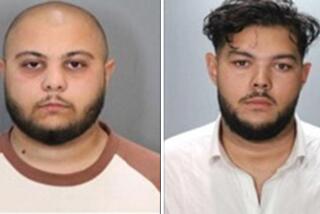On the Edge of Emancipation : Immigrants: Ceausescu’s downfall has liberated Romanians in Southern California who had treated each other as if they were spies for the dictator.
After 28 years spent in political prisons or under the scrutiny of Romanian secret police, Nicolae Popa arrived in Southern California expecting to find a place where he could speak openly about his hatred for communism.
But two days after he settled in Pico Rivera, a fellow Romanian taught Popa his first lesson about freedom in America: “If you want to have a good life here, keep away from other Romanians,” the 58-year-old electrical contractor said he was told.
Like others before him, Popa soon realized that, even here, fears of spies and secret police would continue to foster the mistrust prevalent in his homeland.
The result has been a Romanian community in Southern California that cannot properly be called a community. In a region where immigrants of all nationalities manage to recreate the ethnic flavor of home, there is no bustling Little Bucharest.
Today, however, Romanian immigrants believe their community is on the verge of an emancipation, mirroring in a smaller way the liberation of their country after the recent overthrow of Nicolae Ceausescu’s Communist dictatorship.
For the first time since they settled in Southern California, immigrants say they are beginning to witness an unprecedented openness. Already Romanians here who once refused to join anti-communism demonstrations are trumpeting their pro-democracy sentiments to anyone who will listen in gatherings in Westwood and on the steps of City Hall. Those who once were afraid to celebrate Mass can be seen filling church pews, church officials say. And Romanian acquaintances are embraced instead of greeted with suspicion.
“It is amazing,” Popa said. “When many of us left Romania we were kind of brainwashed. The government told us, ‘We will let you leave, but watch what you do because our hands are long enough to reach you and you still have families here.’ Now, like in Romania, we have no fear. We can talk free against the government.”
Hundreds of Romanian-Americans also have banded together to raise money and send food, medical supplies and clothing back to their native country.
This, they say, is only the beginning. Today, where there are no support services, no large Romanian community groups and little information to help immigrants settle in other countries, they hope one day there will be organizations and relief services.
An estimated 10,000 Romanians live in the Los Angeles area, scattered in neighborhoods ranging from Santa Monica to Bell with no definable Romanian settlements, shopping strips or markets. The only places where more than 50 Romanians could be found together, immigrants say, were the churches.
The one Romanian organization in Los Angeles, the 65-year-old Romanian Cultural Society, revolves around the Romanian Orthodox Church and church activities. The group has about 200 members and meets once a month.
Of the three restaurants that serve Romanian food in Los Angeles, only one, Felicia Zanescu’s Hollywood establishment, Mignon, displays a visible sign of Romanian heritage: the flag of red, yellow and blue hangs on a pole outside.
But until the execution of Ceausescu, good Romanian food such as goulash and stuffed cabbage was about all Zanescu’s customers received. Zanescu did not chat at great length with her patrons, believing any one of them could be a Communist spy.
“Not now,” she said. “Now I speak freely.”
For immigrants like Sorin S. Pricopia, 40, a stunt coordinator in Hollywood who has lived here for 19 years, the transformation in his home country means he can now write letters to the editor and sign them without reservation.
In the last few weeks he has written three letters to the editor. In the 18 years before that, he had written only two, he said.
For Greta Lonita, 26, who escaped from Romania when she was 15, the death of the Communist regime means she can discuss politics on her own telephone. There will be no more runs to the pay phone because of her suspicions that her home telephone might be tapped.
And for Nicolae Focseneanu, 44, a dental technician in Huntington Park who said he used to test each immigrant he met with prickly political questions, Romania’s liberation means he can be less afraid that the person sitting next to him is a spy.
“Now begins a new era not only for the people in Romania, but for the Romanians in exile,” said Cornel Dumitrescu, the co-editor of New York-based “The Free World,” the largest Romanian newspaper outside Romania.
Said Father Cornel Avramescu, pastor of one of Southern California’s largest Romanian Orthodox Churches, located in Tustin: “Our problem lies with unity in the mind. That is what we have not had and that is what kept us from becoming close to one another. Now I believe we truly will learn to be unified.”
All immigrants agree, however, that a new cohesive community will not happen without great effort. Forty-five years of Communist oppression and its repercussions cannot be shed as simply as an old suit, they say.
“When we have lived with mistrust for a lifetime, it is hard to overnight become trusting,” said Mihail Badica of Bell. “I really hope we will come together, but when and how, I don’t know.”
“It is a sad reality among us,” said Father Liviu Olah, who is the pastor of one of Southern California’s largest Romanian Baptist Churches, located in Bellflower. “We have been taught not to talk to one another. We can never know who is a traitor, or who is a friend. It has been that way for so many years, mistrust is now second nature to us. It is a reflex.”
About 3,000 Romanians are allowed by the U.S. government to immigrate to the United States each year, according to the Immigration and Naturalization Service. Many others risked death by immigranting illegally.
The immigrants insist that, at some point, security forces and Romanian spies picked up their trails and watched them, sometimes even trying to harm them.
Ceausescu’s government agents “really worked hard to keep us divided,” said the Rev. Father Alecse Constantin, pastor of the Holy Trinity Romanian Orthodox Church in Los Angeles.
Constantin and other immigrants say Communist agents were seen in California at church services and small gatherings of Romanians. Rep. Robert Dornan (R-Garden Grove), who has aided several Romanians resettling in the United States, said it is widely believed that the Ceausescu government sent false defectors to infiltrate Romanian immigrant communities.
The Rev. Georghe Calciu, an Orthodox priest living in Washington who spent 21 years in political prison in his native land and who is regarded by many Romanian immigrants as their moral leader, maintains that would-be assassins directed by Ceausescu twice tried to poison him in the last four years. Shortly before the revolution, he said, he was warned by two FBI agents that Ceausescu had sent agents after him.
FBI spokesman Carlos Fernandez would not comment on Calciu’s claims.
Immigrants point to other evidence to support their claims that they were being watched by Ceausescu’s security agents.
Avramescu said that, six months ago, he was visited by a parishioner who told him she could no longer attend church services because she had been threatened by secret police while visiting relatives in Romania.
The woman told him she believed her relatives would be harmed if she went to Mass every Sunday. At most, she said, she could come once a month. But until the revolution broke out, Avramescu never saw her again. On Christmas Day, the day Ceausescu was reported to be under arrest, the woman came back to his church.
“I don’t think anybody understood what was going on in our country and what it was doing to us,” Avramescu said.
More to Read
Sign up for Essential California
The most important California stories and recommendations in your inbox every morning.
You may occasionally receive promotional content from the Los Angeles Times.










